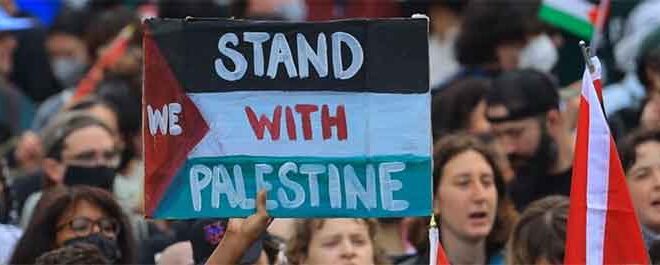Mainstream journalists and politicians have engaged in a campaign of mass slander against U.S. college students protesting the Gaza genocide. Their “antisemitism” Big Lie echoes the racist hate campaigns of the past, inciting hostility toward young people whose only crime is their dedication to justice.
A newly published survey provides some important context for these protests and undermines the smear campaign against the protesters.
Students Are Not Antisemitic
The Chicago Project on Security and Threats (CPOST), a project of the University of Chicago, recently published “Understanding Campus Fears After October 7 and How to Reduce Them,” subtitled “a non-partisan analysis of Antisemitism and Islamophobia among College Students and American Adults.” Robert A. Pape, political scientist and CPOST’s director, writes that its findings “are an opportunity to re-center the national discussion around students and away from politics.” Let’s hope so.
Understandably, Pape and his colleagues focus on the steps that should be taken to make all students feel safe on campus, regardless of religion, ethnicity, or politics. In doing so, their report includes important findings that deserve wider attention.
Is there a “climate of antisemitism” on campus? CPOST’s study found that college students are less Islamophobic than the general population, but they are not more antisemitic. The level of student bias against Jews is the same as their bias against Muslims, but no greater.
Why, then, is there a national debate about campus antisemitism and none about the comparable scourge of Islamophobia? What message does that send to the Muslim students whose fears are being ignored?
The Protests Aren’t Antisemitic, Either
House Minority Leader Hakeem Jeffries wants a vote on the “Countering Antisemitism Act,” but neither he nor the president have proposed similar safeguards against Islamophobia. House Speaker Mike Johnson, who said that Columbia protesters have begun “to threaten lives and intimidate and harass people,” has an even more draconian antisemitism bill—also without plans to address Islamophobia.
President Biden, like the others, has condemned what he calls “antisemitic protests.” That slur is challenged by the Chicago study. The authors found that “while college students are not more antisemitic than the general population,” they are “more anti-zionist.” They also found that “prejudicial antisemitism and anti-zionism are largely separate phenomena,” with an “overwhelming” absence of any overlap between antisemitism and a negative view of Israel.
We’ve know for decades that the lie which equates anti-zionism with antisemitism serves a political goal by suppressing speech. We now have evidence to back it up.
“From the River to the Sea”
One protest slogan has been cited over and over as “antisemitic,” with accusers claiming it calls for genocide against Jews: “From the river to the sea, Palestine will be free.”
Most students do not use it in anything approaching a genocidal way. The CPOST study found that only 14 percent of Muslim students, or roughly one in seven, interpret that slogan “to mean the expulsion or genocide of Israeli Jews.” That figure is too high, as is the 13 percent of students who believe that violence against Muslims is sometimes justified. But it also tells us that most people who use the slogan are not calling for harm against anyone.
That makes sense, since the phrase can be interpreted nonviolently in at least two ways. One is that a two-state solution should include the territory ceded to Palestine in 1948, which touched both the Jordan River and the Mediterranean Sea. Another is that Israel and Palestine should become a single, democratic, non-racial and non-theocratic state, with rights and safety for all. Under that interpretation, “Palestine will be free” is no more a call to genocide than “South Africa will be free” was a call to kill whites during the anti-apartheid struggle.
The study does note that the slogan makes two-thirds of Jewish students feel unsafe. For that reason, Pape recommends avoiding it.
But we now have confirmation that campus officials, politicians, and the media are misleading the public about that phrase. They’re endangering the protesting students and worsening the fears of pro-Israeli students. They should stop.
Conclusion
The political scientist Bernard Cohen once wrote that, while the press isn’t always successful and telling people what to think, “it is stunningly successful in telling people what to think about.” The student protests are a textbook example. The debate around these protests is focused on the false charge of antisemitism, not on the moral challenge raised by the protesters.
Does antisemitism exist among them? Since it is pervasive in this society, the answer is yes. But amplifying a comment or two from a couple of isolated individuals is a totalitarian smear tactic. Republicans did it with the racist Willie Horton ads in 1988. Trump does it when he highlights crimes allegedly committed by immigrants. And politicians, journalists, and college administrators are doing it today with their charges of protester antisemitism.
CPOST’s moderate recommendations for easing campus fears include, “Clear and immediate communication by college leaders condemning violence and intimidation by students and against students on their campuses.” Instead, those leaders are ordering police violence against protesting students, as they and the political/media elite stoke more fear and hatred against them—even in the wake of the anti-protestor mob violence at UCLA. That isn’t just wrong; it’s a dereliction of duty.
As leaders, these prominent individuals have been entrusted with the care and protection of the nation’s young people. Instead, they’re slandering them and putting them at risk. Why? To distract us from a genocide.
The people who make, report, and teach history should take note: it has never been kind to those who spread Big Lies. It won’t be this time, either.
 Eurasia Press & News
Eurasia Press & News



